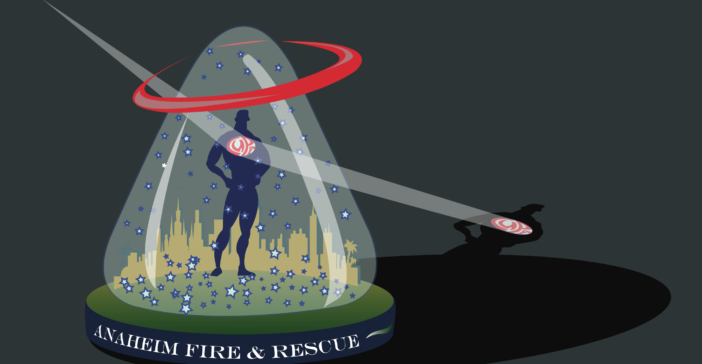All cities generate their share of hazardous waste and materials. Anaheim is unique in that it has its own team of inspectors dedicated to making sure hazardous materials are properly stored, handled and disposed of by local businesses.
“We’re more or less a local authorized extension of the CalEPA,” said Anaheim Fire & Rescue Assistant Fire Marshal Gary Blevins, who heads up AFR’s Certified Unified Program Agency (CUPA).
A CUPA is an authorization from the state for a local agency to administer and implement standards for hazardous materials and waste under the California Environmental Protection Agency, Blevins explained.
Many cities are participating agencies, which means that while they may administer some state programs, they ultimately report the information to the county, which reports it to the state. The county also handles some administration of programs for the city.
“Anaheim is unique in that it is the only city in Orange County that is a full-fledge CUPA that does all of the programs on its own,” Blevins said. “We don’t report any of the findings to the county, we report to the state.”
The CUPA is a section within AF&R and includes four full-time and one part-time hazardous materials specialist. They are non-sworn fire department members assigned to areas of the city and tasked with inspecting businesses, filing reports to the state and issuing reports to businesses.
They make sure businesses are in compliance with local, state and federal laws regarding hazardous materials and waste.
The businesses must have the proper documentation to show hazardous waste has been properly disposed of, for example. They must also report all the chemicals they may have in bulk quantity – for instance, large amounts of compressed gas, which could impact a fire or spill.
Businesses need to notify their local CUPA if chemicals in bulk reach a certain state minimum, and then the CUPA would normally notify the local fire department so it knows going into a location during a fire if there are large amounts of flammable chemicals housed there. But it works a little differently in Anaheim, since the CUPA is part of the fire department.
“When you are the fire department – and the CUPA – you’re actually out collecting this information for yourself,” said Blevins.
While residents and visitors may be surprised as to some of the businesses that require hazardous materials checks, it’s second nature for CUPA inspectors in having a general idea what toxic load businesses are generating.
Hotels are a good example.
“People don’t think about hotels … they’re running almost like a little city,” said Blevins. “There’s everything that you can imagine to keep a place rolling.”
Hotels have underground and above-ground tanks, much like a utility plant that keeps things like the AC running. There are also backup generators in case of power outages that must be inspected.
“We’re regulating the hotel just like we do everywhere else,” Blevins said.
Even warehouses without manufacturing still need inspecting because of the propane tanks they need to run their forklifts. Woodworking shops might have some paint that needs regulating.
And then there are the usual suspects like gas stations, auto repair shops and metal plating shops. Metal plating shops have developed somewhat of a bad reputation – though they’ve cleaned up their act to a certain extent over the years.
“Generally the shops are hard to maintain clean … none of them look clean,” Blevins said. “Everything in there is steaming and it looks like a Batman movie when you go in.”
But sometimes the steaming chemicals are actually cleaning solutions that require heating and the bubbling tanks are actually a result of added oxygen.
“They really became the poster child for evil, hazardous waste and hazardous materials, but it’s not always the reality anymore,” Blevins said.
Disposal of hazardous waste can get tricky.
A business generating large amounts of water contaminated with something has to properly dispose of it. And it can’t be poured down the drain. The best method involves treating the water to remove the hazardous portion so that the water can go down the drain and the hazardous waste is removed and disposed of properly. And this requires CUPA authorization.
In addition to the regulatory portion of CUPA, inspectors also will assist as technical experts in emergency hazmat situations – like the recent diesel spill on the freeway and a residential call for someone making fireworks in a senior home.
“We are kind of an attachment to our assigned hazmat team, which is a fire response and emergency response unit,” he said.
CUPA inspectors form a science-based team working diligently to make sure businesses comply to EPA standards for the sake of the environment and people’s health. An inspection can run from 30 minutes to all day, however long it takes.
“Just yesterday one of our guys was on an inspection all day in the rain,” said Blevins. “If we’re not done, we’re not done.”
 Behind the Badge
Behind the Badge



